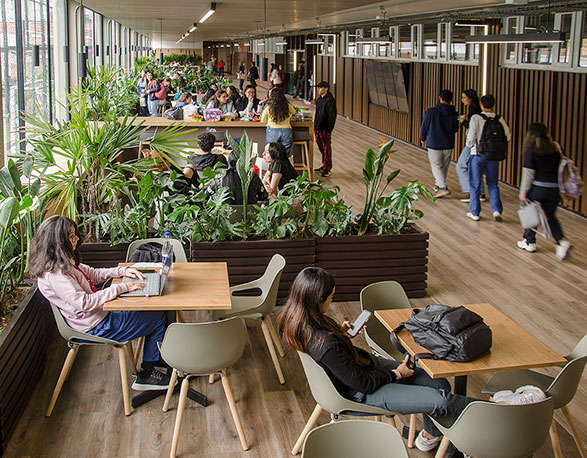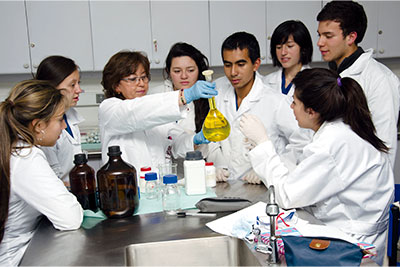Women from Universidad del Rosario motivated by research
By: Lina María Leal Villamizar
Photos: Alberto Sierra, URosario https://doi.org/10.12804/dvcn_10336.42561_num7
Science and Tech

By: Lina María Leal Villamizar
Photos: Alberto Sierra, URosario https://doi.org/10.12804/dvcn_10336.42561_num7
Forty-four percent of those engaged in scientific research are women, even though they constitute the majority of those who complete their undergraduate and master's degrees in Latin America, according to a 2023 Ibero-American Observatory of Science, Technology and Society (OEI) study. In the case of Colombia, the report indicates that 27 percent of women access higher education; however, the National Information System of Higher Education highlights that for postgraduate levels in 2022 it is possible to reduce the gap with 49 percent of women who manage to finish their studies.
“This lower participation of women is an important factor at a key level for their subsequent insertion into the scientific system,” warns the OEI in the report. It also adds that proof of this is that less than half of the publications of Ibero-American scientific articles had female authors.

Two researchers of Universidad del Rosario, undergraduate and graduate, stand out for their contribution to the growth of research in their respective fields of interest: the environment in criminal law and marketing in higher education.
María José García Prada, a sixth-semester student in the Faculty of Law, and PhD. Marelby Amado Mateus, from the School of Business Administration, are examples of inquisitive minds that are changing the way we perceive and understand the world around us and that with their contributions to academic publications manage to reduce the gender gap in the vast field of research. Both demonstrate that curiosity and a desire for knowledge can lead to discoveries that transcend borders and cultures.
Studying the Role of the Environment in Jurisprudence
María José remembers how, as her classes were taking place, questions began to arise that often had no answer. This is how in the corridors of the university, when she spoke with the professors at the end of the classes, she met the PhD. María Camila Correa, who became her mentor in the world of research and invited her to participate in the Criminal Law Research Group. Since then, they have addressed issues related to gender and the environment. García Prada points out that this exercise broadened her perspective, her mentality and her way of seeing life and jurisprudence. All of this led her to fall in love with research and criminal law.

According to a report by the OEI in 2023, 'less than half of the publications of Ibero-American scientific articles had female authors.'
When the opportunity arose to participate in the XIII Edition of the 2023 National Seedbeds Competition, focused on the interdisciplinarity of the environment, she joined fellow program student Alejandra Milena Oviedo. Together, they took on the challenge of investigating the limits, challenges, and scope of the crime known as “ecocide” in Colombian law. This refers to the destruction, incapacitation, disappearance or generation of a “serious environmental impact” that damages natural resources, in violation of existing regulations.
According to what the young researcher explains, this is a relatively new crime in Colombia, since it takes effect in 2021 with Law 2111and has not been widely discussed in the legal field. However, legal protection of the environment has boomed in recent years, giving it a leading role at the national and international level in academic debate. “Considering that crimes against nature are recent, there are still gaps regarding the application of the norm to counter them. That is why we wonder if the sanctions established in criminal law are the best tool to guarantee the protection of the environment or if public policies or other measures are required,” he warns.
For a month, the students searched the existing legislation in the country, looking for the background that has led to the legal protection of the environment and its subsequent relevance in the criminal field. They also identified the criminalization of ecocide in Colombia, from the scope of criminal protection and its interpretative difficulties. And from the above they reflected on the implications of ecocide from an "ecocentric" and not anthropocentric perspective, where the reason for protecting ecosystems and biodiversity is given by its own value and not by the utility it generates to humans.
“The environment has been recognized as a subject and object of rights, since its protection is a measure that allows the guarantee of the right to a healthy environment and the fulfillment of state obligations to ensure the sustainable development and conservation of natural resources,” the researchers maintain. In this sense, the care of the environment constitutes a joint responsibility of all in society and legislation must ensure its protection.
Research reveals that criminal law is a necessity to protect ecosystems. And, although it is effective in many cases, it is insufficient, since so far the legislation has a limited character given its difficulties in determining the extent of the damage, those responsible and those affected, and is solely focused on punishing harmful actions, without really having clarified what a “serious environmental impact” is. It must therefore be complemented by a comprehensive plan of action that includes measures to prevent, mitigate and repair damage to natural resources to strengthen the legal framework and achieve real protection of nature that guarantees the right to a healthy environment, sustainable development, conservation of resources and the survival of humanity.
Last June, the students presented their results in the university's seedbed competition, which received 20 papers from territorial entities such as Medellín, Cartagena and Cauca. García and Oviedo won the first place in the competition, and as a reward, their research results will be published in a book produced by UR.

María José García, a student in the Faculty of Law, entered the world of research as a member of the Criminal Law Research Group where they address issues related to gender and environment.
“It is a support for us as students and empowers us to see that not only graduated individuals have a voice in the academic debate, but we can take our questions far beyond the topics covered in class. This has been an expression of curiosity, a desire to continue researching… and to take on the world with questions. And while many of them cannot be answered, what is valuable in research is the journey, not just the result,” concludes María José.
The Importance of Considering Students in the Reputation of Universities and Research Centers
Marelby Amado Mateusis now a Doctor of Science in Management of the School of Business Administration of the URosario. During her 13 years of teaching experience in the field of business administration she has focused her research on strategic marketing management. In the framework of her doctoral thesis in 2018, she focused on a topic that she not only taught, but also observed in the classrooms and university corridors: the relationship between the perceived value of students of the educational service from their experiences in an educational institution and the reputation that this can generate for the university.
The reputation of higher education institutions is obtained through various assessments from stakeholders over a period. It is usually evaluated by indicators that cover research results, innovation, rankings and performance in knowledge tests, among other parameters. Because of their importance, universities allocate significant resources to strengthen their prestige and seek high-quality accreditation. However, is this acknowledged and meaningful to students?

Marelby Amado Mateus, from the School of Business Administration, explains that “giving the best experience to the student is to train them in what they require and need to develop learning and skills that allow them to perform in a particular sector. In this way, he or she is the forerunner of the brand, that is, of the reputation of the university...".
PhD. Amado's thesis proposed to analyze the role of university student perception in the impact of universities' reputation. For this, she began by recognizing that within the multiple stakeholders that an institution has, the student plays a leading role in their role as clients and co-creators of the education service. Amado emphasizes that the university student is classified as a client only at the time of enrollment, and from there emerge roles that require specific management or administration during each of the stages that goes through its training process.
To advance this study, the researcher surveyed 385 students from two private universities: one accredited in high quality, according to the standards established by the Ministry of National Education, and another that had not achieved this recognition. She wondered: What is the relationship between perceived value, customer experience and reputation in accredited and unaccredited private universities, from the student's perspective?
The conclusion of her study states that, although high quality accreditation is a relevant element, it does not stand out in the perception of students of both types of the universities evaluated. This can occur to the extent that students tend to assume that all institutions have some level of accreditation and do not differentiate high-quality from qualified registration. On the contrary, the researcher emphasizes that what really makes the difference and adds value is the experience of the university student in his or her educational process, as well as the accumulation of opinions that make up a solid reputation, among other relevant aspects.
“To give the best experience to the student is to train them in what they require and need to develop learnings and skills that allow them to perform in a particular sector. In this way, he or she is the forerunner of the brand, that is, of the reputation of the university. The same thing that would be done in other types of sectors applies to the field of education,” says Amado Mateus, who with the results of his research work validated a tool or model that allows evaluating performance from the perspective of the student, so that university institutions can manage their reputation.
The study attracted the attention of teachers of Universidad de Alicante, Spain, where it was replicated with a sample of 333 students from that educational institution.
“I was surprised that the structural model behaves in a similar way, which indicates that it transcends the cultural and shows its solidity,” Amado says. Even a researcher from Australia has expressed his motivation to apply the model in Australia. In this regard, Professor Marelby emphasizes that these connections interweave and enrich research.
“I am delighted that someone can and wants to use my research, which was divided into seven specialized articles,most of which were published in high-impact international academic journals, such as PLOS One. I hold nothing back, so anyone can download the data (see link), the instruments and do their own analyzes. Everything will be available for use for academic purposes. Knowledge is for sharing, and that is what researchers do,” says the academic whose questions and ‘appetite for knowledge’ now represent a model that promises to leave a mark on different scenarios in Colombia and the world.
Model for posterity
The analysis of the study data included a structural equation model. What it actually shows is that the factors that make up each of the variables (perceived value, student experience and reputation) are related and can influence the reputation of universities. Therefore, it is suggested that managers of higher education institutions can manage these variables to achieve better performance and achieve higher reputation standards.